Nordic Monitor
Turkey and Azerbaijan have entered into an energy cooperation agreement that includes the use of hydrocarbon resources, production and trade of petrochemistry products, construction of LNG (liquefied natural gas) terminals, development of electricity trade, exploration of mineral resources and renewable energy and energy efficiency.
The two sides will also cooperate in promoting investments in the fields of energy and mining through public and private companies. The recent accord is expected to deepen bilateral cooperation on energy. Both sides regularly discuss issues of bilateral and regional energy cooperation.
In November 2019 Turkey and Azerbaijan formally marked the completion of the Trans-Anatolian Natural Gas Pipeline (TANAP) which comprises the longest stretch of the $40 billion Southern Gas Corridor, a series of pipelines that will carry gas from Azerbaijan’s Shah Deniz II field to Europe. The project was officially launched in June 2018. It stretches from the Turkish-Georgian border to the Turkish-Greek border.
Azerbaijan accounts for the largest share of Turkey’s natural gas imports. According to the Azerbaijani energy ministry, more than 27.3 percent of Azerbaijan’s natural gas exports in 2019 went to Turkey. In January 2020 Azerbaijan exported 945.18 million cubic meters of gas from the Shah Deniz field to Turkey, 16.9 percent higher than the same period last year.
Turkey’s Energy Market Regulatory Authority (EPDK) released a report in April on the country’s gas consumption in March 2020. The report pointed out that Turkey recorded an increase in the share of LNG in its gas imports in March 2020, compared to the same period of the previous year, and Azerbaijan ranked first in terms of Turkey’s pipeline gas imports, leaving Russia and Iran behind.

According to the text of the agreement, obtained by Nordic Monitor, Turkey and Azerbaijan pledge to cooperate in development and use of hydrocarbon resources; geology and reservoir engineering; production and trade of petrochemistry and processed petroleum products; development and production of spare parts and maintenance of LNG terminals and related technologies; and the deepening of petrochemical and oil refining processes.
The agreement in Article 4 underlines that the parties shall focus on “exploration, production, transportation, processing, commercialization, distribution and trade of hydrocarbons (onshore and offshore),” adding that they will assist each other in “construction, rehabilitation, development, operation, production and maintenance of natural gas storage facilities and transmission infrastructure.”
President Recep Tayyip Erdoğan paid an official visit to Baku to attend the eighth meeting of the Turkey-Azerbaijan High Level Strategic Cooperation Council, held on February 25, 2020. Following the meeting, Turkish Energy and Natural Resources Minister Fatih Dönmez and Azerbaijani Energy Minister Parviz Sahbazov signed the deal that extends the legal framework for bilateral energy and mining cooperation.
While the 14-article agreement was was approved by Azerbaijan’s parliament Milli Majlis on May 31, President Recep Tayyip Erdoğan submitted the accord to the Turkish parliament for approval by on June 8.
The letter submitted to parliament seeking approval of the energy cooperation deal with Azerbaijan:
The agreement in Article 6 underlines that the parties will evaluate cooperation opportunities for exploration of mineral resources and geological research, and develop technologies in that field.
In accordance with Article 3, the parties will establish a working group to identify activity opportunities in the field of renewable and clean energy and energy efficiency, and “encourage the authorized bodies and investors of both Parties to work jointly to support and develop the projects in these fields.”
The deal also covers technical cooperation in the construction, operation and maintenance of electricity transmission networks; development of electricity trade and interconnection capacity; and exchange of experience on electricity market regulation.
The terms of the agreement will be executed by the Ministry of Energy and Natural Resources on the Turkish side and the Ministry of Energy for Azerbaijan. The deal is valid for five years with automatic renewal for successive periods of five years. According to the agreement, either party may notify the other of the intent to terminate at least three months in advance through diplomatic channels.
The energy and mining cooperation agreement is posted below:












